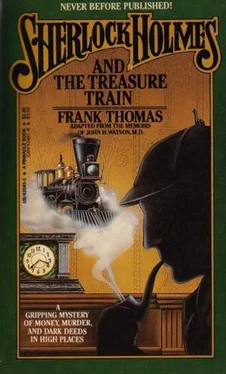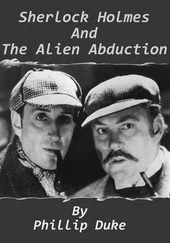"I might have known," chuckled the sleuth as he waved me toward the door.
Chapter 20
Denouement
THE COUNCIL ROOM of the B & N Railroad was much as I remembered it; but then, despite all that had happened, our previous visit had been but eight days ago. The board of directors were not in evidence and that caught me up short. I figured Alvidon Chasseur for an exhibitionist and thought he might relish an audience when he received the Inter-Ocean payment and had the opportunity to laugh at Sherlock Holmes. Claymore Frisbee had set up our meeting for the ostensible purpose of paying the insurance claim. With the rail tycoon was a sallow-faced man that I earmarked with the title secretary. Also present was the grizzled old board member Chasseur had been conferring with on our first visit. This time the magnate rose to indicate our seats alongside the great oak table. As before, he ignored me completely but did direct a quizzical glance at Orloff.
"An associate," said Holmes, which seemed to satisfy Chasseur. Orloff did not sit at the conference table with us, but seemed much interested in a chest against the wall opposite the fireplace, obviously decorative, for it served no purpose. It was a fine old piece, of lowlands origin I thought, and surely with its original lock and key. I made note to check it for the name of the cabinetmaker, since they signed things in those days.
Chasseur decided to ignore Orloff as well, centering his large eyes on Holmes. There was a malicious twist to his thin lips.
"Our second meeting is under different circumstances indeed, Mr. Holmes. I will be frank. It is not quite the tidy wind-up one associates with he who is reputed to be the greatest man-hunter of them all. By his own admission, I might add."
"We all make mistakes," replied Holmes, and I never expected to hear him say that. But then he was letting the pompous railroad man take in more wind before he punctured his balloon. "During my last visit, I labeled Colonel Moran as the finest shot our eastern empire had produced. At that time I had not seen your man Ledger in action."
"I would talk to you about that," said Chasseur excitedly. "Ledger has disappeared, and my railroad detectives are searching for him. Scotland Yard as well, for he has to be involved in the robbery."
"Before it was over he was, perhaps not in the manner you think."
Chasseur gave Holmes a strange look but decided not to pursue this. "Now to business, for my schedule is tight. The matter of the payment from Inter-Ocean."
"I don't have it," replied Holmes blandly.
"But Frisbee promised to . . ."
"He promised to honor your claim at this time if the gold was not found."
"That goes without saying."
"But I've found it, you see."
Chasseur leaned back in his chair and exhaled, and I'm blessed if it didn't sound like air escaping from a balloon. There was consternation on his face. I couldn't figure if he was amazed at recovering the shipment or disappointed at not being able to rub Holmes' nose in the ground.
"This cannot be one of those practical jokes I'm told you indulge in," he finally stammered.
"Hardly. It is a reasonably simple story. Most cases are, once solved. The participants may be familiar to you. Ezariah Trelawney, Burton Hananish, and Ramsey Michael were involved in a scheme to pirate four hundred thousand pounds' worth of gold from the west coast banks. There was another hundred thousand to be picked up from the Inter-Ocean insurance as well."
"But where is the gold, Mr. Holmes?"
"In the Bank of England."
"Wait, now! I did know Trelawney and Hananish, and the latter's deposit in the Bank of England is old news. But it was made prior to the B & N shipment."
"Your shipment was of crates of baser metal with little value indeed."
Now Chasseur's shrewdness became evident, for he grasped the situation immediately. "Amazing. This Michael you mentioned. He was murdered, for I read it in the papers. Trelawney was killed as well, a while back. Was there a disagreement between the conspirators?"
Chasseur thought on this for a moment, then pounded the table in front of him. "Divine intervention, that's all you can call it with Hananish dead as well."
"How did you know that?" asked Sherlock Holmes.
"Why, the news came to me at midmorning, I believe . . ."
"A cable, Mr. Chasseur," said the shallow-faced secretary.
"Exactly. If the three conspirators have met their end, you can understand my immediate thought regarding a higher power. But come, yours is the practical approach, and there must be a rational explanation. Trelawney was involved in the gold shipment, as was Hananish. What alerted you to this Michael fellow?"
"Something relative to his murder," replied Holmes.
"And you were able to tie the three together? The tales of your amazing professional powers are not overstated, sir. How did you do it?"
"They served in the same regiment in the Crimea. Also, their names were a clue. Relative to the Bible, you see."
"The Bible?" Chasseur appeared befuddled.
"You may recall that Nebuchadnezzar had brought to his court in Babylon certain of the children of Israel."
"Wait, Mr. Holmes, for I know my Bible well. You speak of Shadrach, Meshach, and Abednego. Good heavens, I see it! In Judah they were Hananiah, Mishael, and Azariah. That's what tied them together in your mind? Brilliant."
Holmes gestured in a modest manner, a cloak ill-fitting to his shoulders. "It was a coincidence that would be hard to overlook. Like three ladies on a committee named Faith, Hope, and Charity. They would become known to each other, I'm sure."
Chasseur was regarding my friend, reluctantly I thought, with some awe. "With this thin thread you tied them into the plot to swindle the Inter-Ocean," he said.
"Not exactly. Recall that there was someone else associated with the three wise men."
The tycoon preened himself. "I do, sir. Let me quote to you: 'And these three men, Shadrach, Meshach, and Abednego, fell down bound into the midst of the burning fiery furnace.'"
"'Then Nebuchadnezzar the king was astonished, and rose up in haste, and spake, and said unto his counselors, Did not we cast three men bound into the midst of the fire? They answered and said unto the king, True, O king.'"
"'He answered and said, Lo, I see four men loose, walking in the midst of the fire, and they have no hurt; and the form of the fourth is like the Son of God.'"
Chasseur was regarding Holmes rather tauntingly. "Surely, sir, you are not suggesting that the Son of God was in cahoots with three modern-day bandits?"
"A scholarly rendition from the book of Daniel, Mr. Alvidon Daniel Chasseur. My compliments."
I slid my hand into my coat pocket, gripping the Smith-Webley, for now it was obvious. The implication was not missed by the rail magnate; and I thought he paled slightly, though he retained his hauteur. Holmes did not wait for a response.
"It was Daniel, renamed Belteshazzar, who came to Babylon with the others; and it is the fourth man I'm after. He has to exist, else nothing makes sense. Ezariah Trelawney was a miserly soul who never left his native village of Shaw. Hananish was a cripple, entrenched in Fenley. Michael was very much of the London scene. Unless they transacted their considerable business by post, there had to be a connective link. Also, the well-planned robbery depended on a knowledge of the time and route of the treasure train, plus the plan to guard it evolved by Ledger."
"Trelawney was a stockholder in Birmingham and Northern. So was Hananish," sputtered Chasseur; but his argument sounded weak, even to him.
"Probably Michael as well," replied Holmes. "Which brings us to the nub of the matter. There are too many stockholders of the B & N. You were originally financed by a cadre of speculators in Scotland. The Scotch are of the opinion that they hold seventy-five percent of your rail empire. But how about the financial group in Cornwall? You attended a stockholders' meeting there recently; and I learned they hold around eighty percent of the outstanding stock of the B & N, or think they do. Your three partners have large blocks of the company as well."
Читать дальше












